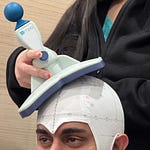Author’s Note: This writing was adapted from a series of conversations around race in America and edited as audio, recorded in 2020. The podcast of this writing is the real thing, as it were. What follows as text is edited to clarify the narrators, absent the audio. Please consider following the podcast1 associated with this newsletter and leaving a 5-star review on Spotify or Apple Podcasts. Please subscribe to support high-impact content like this.
The author, David Foster Wallace, described the experience of reading his novel Infinite Jest as intended to feel “tornadic,” like you're in the middle of a tornado. That's what the last several weeks have felt like.
Protesters:
"Racist ass police! No justice, no peace! Fuck these racist ass police! No justice, no peace!"
"Fuck these racist ass police!"
I originally tried making this episode some linear narrative, and it just wasn't happening. So, welcome to the tornado of racism in America. Buckle up.
George Floyd spent 8 minutes and 46 seconds gasping for breath. Police officers, some of whom were very experienced, knelt on his back...until he didn't breathe anymore. As a psychiatrist, I often emphasize how the words we use to describe someone's death have meaning. So, I'll say, you know, completed suicide, not commit. And George Floyd was lynched.
Welcome. This is about anxiety, uncertainty, and existential despair. And I recorded the narration in one take because I wasn't, like, going to get it right a second time. So much of what we say about race is calculated, polite, and wrong. So I'm not going to try to do that tonight.
Here we go.
Sequoiah:
"Yeah. My general reaction to all this is a little more, a little more extended. The, uh, fuck".
Owen Muir, M.D.:
That's my teammate. She is a TMS technician at the mental health practice we worked at together. She also works in the community with patients helping put their lives together, but tonight she's a field reporter on the revolution.
Sequoiah:
"I am a TMS tech, Winnicott coach, and black woman. Which seems very important right now.
George Floyd, Say His Name. George Floyd, Say his Name.
So I just got home from a protest in Flatbush. Police would not let us pass. We were chanting with our hands up. And after a while, they decided to push the line backward. We resisted—we stood there with our hands up. They pushed us and pushed us, and when we wouldn't..."
Owen:
Now, as someone with a lot of white privilege, I'm outraged at hearing this, like, wow, this is fucked up. So I called another colleague in the special operations community, and I'm not using names in this episode for semi-obvious reasons, and I heard what he had to say.
Master Sergent:
“The things that U. S. police forces are apparently fully within their legal rights to do, like, use tear gas, would literally have…been against the Geneva Conventions. It's an actual war crime. We cannot gas a civilian population.”
Owen Muir, M.D.:
The person I’m interviewing has over a decade of experience in the special operations community. He has fought and killed for our right to do what my other colleagues were in the street doing, peacefully protesting.
Master Sergent:
"This is a perversion of what the United States stands for. We invade countries who treat their people the way that our police forces are on camera treating Americans "
Sequoiah:
"People started to back up, , and run and they then started to hit us with batons. , I fell. And then we reformed the line."
Master Sergent:
"It's disgusting in a lot of ways."
Owen Muir, M.D.:
So when someone whose life has been dedicated to protecting our freedoms tells me they're upset with what they're seeing, I take that pretty seriously.
Sequoiah:
"Well, the other night, well, last night, when the cops and protestors were getting into, into fights and they were trying to, the cops were trying to push back the protestors, I saw them bring out the batons and, like, start attacking people...and each time they'd tell us to back up and back up and kept pushing us and pushing us. And finally, there was a frustration in the air, and people started to act out."
Owen Muir, M.D.:
Now, as a psychiatrist, my life has been saved by police officers on more than one occasion. I have been physically attacked in hospital settings. The police have been called, and I have not died, and my colleagues have not died thanks to them. And this is Flatbush, Brooklyn, New York, and these people are black people. The Flatbush, at least the area I was in, is a predominantly black neighborhood. So, look, Americans love the police. They are a highly regarded part of society by many people, but that's not the experience for black America I have learned.
Master Sergent:
“There are many things you can do in that spectrum that don't involve actively using force against a human being, which makes the process easier across the board. If I don't have to hurt somebody, the only thing that is hurting another person does for me is further endanger my Troops. "
Owen Muir, M.D.:
Now this makes sense to me because, having run the show in a psychiatric emergency department, where I have to protect myself, other patients, and violent people themselves from getting hurt, sometimes we use violence, but oftentimes we don't.
Master Sergent:
"What started this particular instance has been four cops lynched George Floyd. One guy put his knee on the man. We don't do that to terrorists actively trying to kill us. "
"George Floyd, Say His Name."
Sequoiah:
"It was at that point that they called in more backup and started to attack and arrest groups of gathered people from the neighborhood.”
Owen Muir, M.D.:
Police officers, when they're called to stand trial for the use of force, have a standard called a reasonable officer standard.
I feel like I have to make it relevant for me--a white person—to watch humans being murdered by police and then people killing each other in the streets about it.
There was an article I read about six months ago about yet another person being slammed to the ground, handcuffed behind their back, and suffocated to death by the police. I was shocked..that the person was white. Until I read several paragraphs down that he had schizophrenia. Oh, that's what made it okay.
Reasonable officers can only be judged based on what someone would do in that moment of terror when they have to decide to use force.
Sequoiah:
"I was so emotionally spent and so exhausted. And then we saw marauding bands of police officers going down the street, just telling people to go home and attacking groups of people on the street.”
"George Floyd, Say His Name. George Floyd, Say His Name."
Owen Muir, M.D.:
Police officers are represented by unions. Those unions have spent 20 years bargaining for lack of accountability to protect, in their minds, their members. This means police officers have the right to huddle and discuss their stories before speaking to prosecutors. It means many other things. But importantly, whenever any officer stands trial, the jury is instructed, per Chief Justice Rehnquist, to not use the benefit of 20/20 hindsight in judging their actions, but only what a reasonable, that is, terrified person, would do at the moment.
Master Sergent:
"We have an entire job in the US military to validate whether or not we killed someone the right way."
Owen Muir, M.D.:
The court system is what's supposed to do that for police officers. But it doesn't; it just says, eh, it's okay.
Master Sergent:
"That's an actual thing; we have entire organizational structures dedicated to the legality of murder,"
Owen Muir, M.D.:
Killing black or brown people in America, if you're a police officer, has literally never been ruled against the law. Ever.2
Master Sergent:
"To not call it murder, to call it, to call it killing combatants, that's what a JAG does. Overseas, when they're deployed, they tell you whether or not you can kill this person. And sometimes, even though we can kill someone, we don't because they have a much higher value as an intelligence asset. Or for any number of other reasons. Or they're not actively shooting at us when we go get them. That happens a ton. Because sometimes when you see 20 or 30 goons show up outside your house, breach your door with a shotgun round, rush in, and then point all their guns at you, you won't fight back. And then, okay, well, he's not shooting back at us, so we're going to take him in, and then... "
Owen Muir, M.D.:
You don't get to kill someone. In the U. S. military. Deployed in the field. In Afghanistan. Even if someone's a terrorist, if they're not pointing a gun at you and about to pull the goddamn trigger.
“Cause one of the things I don't want to do is vilify police officers. And, and ...”
Master Sergent:
"I mean, Owen, to be perfectly honest with you, You may not want to vilify police officers, but the things I've seen police officers do in the past week while they know they're being recorded are actively the actions of villains."
Owen Muir, M.D.:
This hit me like a ton of bricks. This is not okay, but when people call for help, and the police arrive, they deal with a crisis. A lot of those crises involve people with mental illness, and police officers are being asked to do a thing that like is a whole medical specialty. Like, I'm a psychiatrist. It was 45 000 hours of training to learn how to calm people down when upset and have experiences we don't have access to. And, if you're called to the scene of a crisis, and someone's acting in a really strange and scary way, and you have a gun. You've been told to protect yourself, don't let yourself get hurt or let this person harm you, and you know nothing bad will happen to you if you pull that trigger. You're going to pull that trigger. More often than not. And that's about a thousand times a year. You're about... God knows it doesn't even matter. The percentage of time you're more likely to be killed if you're black and mentally ill. The fact that we have a statistic for that is fucked up enough. Help isn't helpful for black America. And that's just a fact of life.”
Master Sergent:
"You know, I have friends in New York who are talking about the cruelty they see in these police officers’ eyes. And what's worse, what's truly evil about this whole system is even in the throes of this violence, they're exhibiting racist and preferential behaviors towards white protesters versus black protesters. Or brown protesters. They're active, you know, taking it easier on white people because they're white. "
Owen Muir, M.D.:
And this is just fucking killing me at this point. Ugh. Look, what's happening in the streets is not okay. It's not been okay for hundreds of years. And police officers are part of a system designed to keep order, and order used to mean slaves. That's just why they're there.
Master Sergent:
"Things I don't even fucking think about, man. Like, I'll go for a run or a rock at night. And I'll, I'll like, sometimes I'll go on my own, but if I don't go earlier, like, T. is like, well, I guess I'll go for a run. Like, one day, I just asked, like, why do you only run with me? Why do you only run with me? And she's like, well, it depends. We're in a quiet neighborhood in Florida, and I'm a black woman like I’m; there’s a bunch of Trump signs everywhere like I'm not going running on my own. I was like, wow, yeah, I've never even thought along those lines; I don't question my safety when I go places. I'm hyper-vigilant for a lot of other reasons, but like, there's never a question in my mind, like if someone attacks me, it's not, it's an unexpected event, I'm not expecting, That at any moment, someone might attack me for the color of my skin. Because I'm in the neighborhood."
William Osei, M.D.:
"Hey, I'm Dr. Will Osei.
I am a postdoctoral fellow, an African American psychologist living in Bedstuy, Brooklyn. "
Owen Muir, M.D.:
Dr. Osei is a scholar of racism and multiculturalism.
And helped me explain what it's like for the black kids I've treated at Bellevue all these years.
William Osei, M.D.:
"The average African American, this is like... This is a fact. This is not a revelation because we now have better cell phone coverage of these crimes. I remember being in Cleveland the day following Tamir Rice being murdered in the playground. And I was working with 12-year-old boys in the Cleveland school district. And I was devastated that day, and I went into that school expecting those boys to be devastated that their schoolmate, a kid they used to play with at the playground, was just murdered. And to them, it was nothing. It was more shocking because they knew a dozen people that the police had murdered. They knew that was just the latest murder that year. It just happened to be one that rose to the national conversation, but in Cleveland that year, there were probably 30, 50 police shootings.
Owen Muir, M.D.:
My level of outrage at watching all of this. That's privilege too.
William Osei, M.D.:
"Yes. "
Owen Muir, M.D.:
Because to understand this as anything other than the rules of engagement would be a misunderstanding. For a long time, Black America has known to watch out when you talk to the cops because they can kill you. Nothing's going to stop them if they want to. And they do. On camera. A thousand other times every year. And I wish it were as easy as saying it was a couple or even a lot of bad apples, but that is insufficient.
Master Sergent:
"As far as privilege goes, I’m a combat veteran in the Ivy League. I'm an Arab Jew, but I look white enough that no one asks that question. I wear a suit, and you can't see my tattoos. And I... I can fit in anywhere from West Hampton to the slums of Bangladesh. Like, I'm good. You know what I mean? I have levels of privilege that people use to run for the presidency."
Owen Muir, M.D.:
But the magic of America is that white privilege runs out as soon as power wants it to. My colleague's married to a black woman.
Master Sergent:
"And a huge part of this is like... It's the knowledge that I'm married to a black woman. My kids will be black, and this is like their plight. "
Owen Muir, M.D.:
Usually, we'd have credits now. Instead, I’m going to read these names.
George Floyd, Ahmad Arbery, Brianna Taylor, Trayvon Martin, Eric Garner, Iyanna Jones. Freddie Gray, Michael Brown, Sandra Land, Walter Scott, and a kid on a playground in Cleveland named Tamir Rice.
The podcast is also recorded, edited, and everything by your author, Owen Scott Muir. The audio on this episode is entirely original but janky because my microphone interface was broken when I did it in 2020. So it was recorded into the mics on my computer and phone only. The audio is better than the transcript.
As of the time of this recording…since then, we have found a few officers guilty in a court of law. The standard, however, remains the same.













Share this post